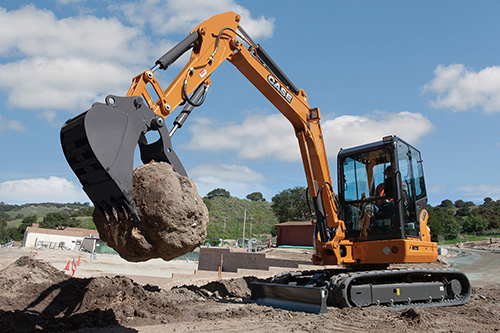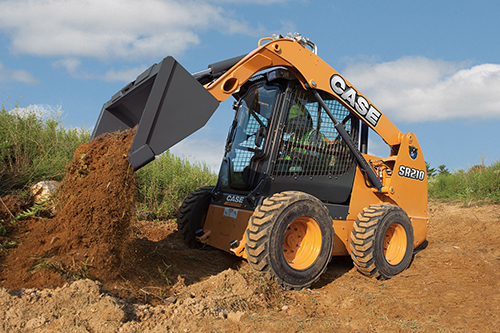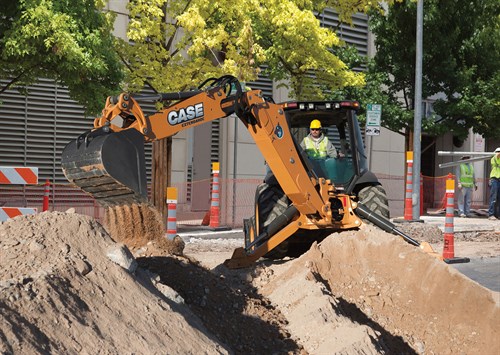One could say it’s better to own a skid steer loader and a compact excavator rather than a tractor loader/backhoe alone. Another could say the opposite, arguing you only need a backhoe since it can do the work of a skid steer and compact excavator. Both are correct, writes the team at Case.
The choice between a loader-excavator combo and a backhoe depends on more than just the machines themselves, requiring a closer look at application, business type, employee skills and operating capacities.
Skid steer/compact excavator combo advantages
Fuel efficiency
Skid steers and compact excavators are small machines with smaller engines than those powering backhoes. Most owners also don’t operate skid steers and compact excavators for extended periods, whereas a backhoe typically runs all day. The advantage in fuel savings generally goes to the skid steer/compact excavator combo.
Maintenance and repair flexibility
The benefit of owning a skid steer and compact excavator can provide flexibility in terms of timing the work that needs to be done on the machines between work cycles.
There will be some jobs where both machines might not be needed at the same time, providing opportune downtime to service one or the other. That isn’t an option when owning only a backhoe, unless the work is done after ‘normal’ business hours.
Attachment selection
Nothing comes close to the number of attachments available for skid steers, which is an advantage over a backhoe. A fairly broad selection of attachments is also available for compact excavators. When it comes to a selection of attachments, it’s hard to beat the combination of a skid steer and compact excavator.
Size and accessibility: By nature, more compact machines like skid steers and compact excavators will provide access to areas that a backhoe loader just can’t get into.
Transportability
If you are working on jobs that only require the use of one machine or the other, or you have two trucks that can haul a machine, each machine can be hauled individually without requiring a heavy rigid driver’s license if the gross weight is under 4 tonnes. Some lighter machines can even fit on a car trailer.
Backhoe-only advantages
More power, more reach, more height
As a larger machine with a bigger engine and more hydraulic power, a backhoe is capable of handling heavier work than the smaller machines. Specifically, a backhoe has a bigger bucket capacity than a skid steer or compact excavator.
It also has more combined horsepower and hydraulic power to lift heavier loads when compared with the smaller machines. Plus, it can lift those heavier bucket loads higher than a skid steer.
Additionally, the boom and stick provides more reach than either a skid steer or compact excavator. Stabiliser legs also provide the stability needed to handle a wide variety of picks that would otherwise require an excavator. Such is not the case with a skid steer or compact excavator.
Travelling from site to site
Owners can take a road-registered backhoe on the road when travelling from one job site to another, assuming the sites are relatively close to each other. The advantage goes to backhoes because skid steers and compact excavators should be trailered when moving from site to site, not taken on the road.
Understand the bigger picture
Most often, the advantage of owning a backhoe or a skid steer/compact excavator mix is determined by the kind of tasks involved and factors associated with the business itself. Consider the bigger picture:
Project scope
No two jobs are the same, which is why the scope of your daily work will often dictate whether it’s most efficient to use a skid steer/compact excavator mix on the job rather than a backhoe, or vice versa. For example, using a skid steer and compact excavator simultaneously for grading and digging can mean the work gets done in half the amount of time it would take with a backhoe.
But that’s not necessarily true if the same job requires a significant amount of digging and heavy lifting. If that’s the case, a backhoe can prove to be more efficient than the skid steer/compact excavator mix because it can move more material in a shorter amount of time. The cost of one operator versus two also needs to be factored into the scope of the project, as do other expenses such as fuel.
Lifetime maintenance
Basic logic says two machines call for twice as much labour and parts over the life of the equipment when compared to one backhoe. Yet that’s not always the case since those two machines might operate half as much as the one backhoe. Determining whether it costs more for maintenance over the life of the equipment for one scenario versus the other requires a detailed analysis given that the outcome is clearly driven by the equipment application.
Equipment application and crew: Is there a greater need to run two machines at once versus having a single high-capacity machine on the job? Are you a solo act without other equipment operators to run two machines simultaneously? Do the jobs involve tight spaces where the small footprint of a skid steer or compact excavator outweighs the higher capacity of a backhoe? The best option is to scale the equipment to the type of work involved, as well as the needs of the business.
Transportability
It would seem easier and less costly to get a skid steer and compact excavator to a jobsite versus a backhoe given the need for a sizeable trailer and heavy rigid driver’s license when hauling almost all backhoes. However, that’s not true if the goal is to haul both the skid steer and compact excavator to the site on one trailer, because it comes with the same requirements as hauling the backhoe. Understanding the requirements for transportability will help drive the decision.
Equipment training
It will likely take longer to train inexperienced operators on the operation of a backhoe versus a skid steer or compact excavator since the backhoe has the functionality of two smaller machines. Yet it might be a non-issue for experienced operators, which is why training is a key consideration in choosing between the two equipment scenarios.
Choose what’s best for the business
Landscapers may be better off with a skid steer and compact excavator because they offer considerable application flexibility. Large contractors regularly involved in road construction and utility work will lean toward the backhoe given the need to tackle heavier work. For the contractor involved in a wide range of work where versatility is crucial, the choice isn’t always clear. The best bet is to think through the options and choose what’s best for the business.
Click here to find Case equipment for sale.





